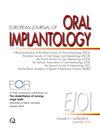Immediate, early (6 weeks) and delayed loading (3 months) of single, partial and full fixed implant supported prostheses: 1-year post-loading data from a multicentre randomised controlled trial.
Q1 Dentistry
引用次数: 10
Abstract
PURPOSE To compare the clinical outcome of single, partial and complete fixed implant supported prostheses immediately loaded (within 48 h), early loaded at 6 weeks, and conventionally loaded at 3 months (delayed loading). MATERIALS AND METHODS A total of 54 patients (18 requiring single implants, 18 partial fixed prostheses, and 18 total fixed cross-arch prostheses) were randomised in equal numbers at two private practices to immediate loading (18 patients), early loading (18 patients), and conventional loading (18 patients) according to a parallel group design with three arms. To be immediately or early loaded, implants had to be inserted with a torque superior to 40 Ncm. Implants were initially loaded with provisional prostheses, replaced after 4 months by definitive ones. Outcome measures were prosthesis and implant failures, complications and peri-implant marginal bone levels. RESULTS Two conventionally loaded patients rehabilitated with cross-arch fixed total prostheses dropped-out up to 1 year post-loading. No implant or prosthesis failed and three complications occurred, one in each loading group. Peri-implant marginal bone loss was 0.19 ± 0.44 mm at immediately loaded implants, 0.18 ± 0.66 mm at early loaded implants and 0.25 ± 0.28 mm at conventional loaded implants. There were no statistically significant differences in complications (P = 1.000) and bone loss (P = 0.806) between the three loading strategies. CONCLUSIONS All loading strategies were highly successful and no differences could be observed for implant survival and complications when loading implants immediately, early or conventionally.即刻、早期(6周)和延迟加载单个、部分和全部固定种植支撑假体(3个月):加载后1年的多中心随机对照试验数据。
目的比较即刻加载(48小时内)、6周早期加载的单个、部分和完全固定植入物支持的假体的临床结果,材料和方法在两个私人诊所将54名患者(18名需要单植入物,18名部分固定假体,18名全固定交叉弓假体)随机分为即时加载(18名患者)、早期加载(18例患者)、,以及根据具有三个臂的平行组设计的常规装载(18名患者)。为了立即或尽早加载,植入物必须以超过40Ncm的扭矩插入。植入物最初装载临时假体,4个月后用最终假体替换。结果指标包括假体和植入物的失败、并发症和植入物周围的边缘骨水平。结果两名常规负荷的患者在负荷后1年内用交叉弓固定的全人工假体进行康复。没有植入物或假体失败,出现三种并发症,每组一种。即刻加载植入物的种植体周围边缘骨损失为0.19±0.44 mm,早期加载植入物为0.18±0.66 mm,常规加载植入物则为0.25±0.28 mm。三种负荷策略在并发症(P=1.000)和骨丢失(P=0.806)方面没有统计学上的显著差异。结论所有加载策略都非常成功,当立即、早期或常规加载植入物时,植入物的存活率和并发症没有差异。
本文章由计算机程序翻译,如有差异,请以英文原文为准。
求助全文
约1分钟内获得全文
求助全文
来源期刊

European Journal of Oral Implantology
DENTISTRY, ORAL SURGERY & MEDICINE-
CiteScore
2.35
自引率
0.00%
发文量
0
审稿时长
>12 weeks
 求助内容:
求助内容: 应助结果提醒方式:
应助结果提醒方式:


